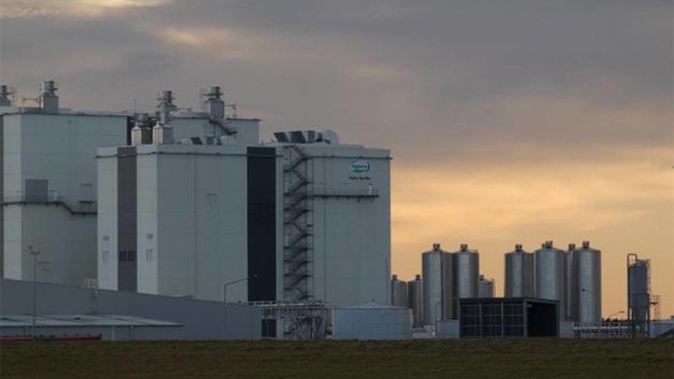
Think of your lounge heat pump, then imagine it the size of a five-storey building.
Dairy leader Fonterra could soon be introducing these giant heat pumps to its processing sites for climate-friendly steam generation.
Fonterra, the world’s third biggest milk ingredients producer and New Zealand’s largest business, is about to start an engineering study with German multinational MAN Energy Solutions to reduce carbon emissions in dairy production by using electricity-powered heat pump technology to reach high enough temperatures to dry milk to powder for dairy ingredients.
Expected to be completed by the end of April, the study is part of the big exporter’s drive to replace non-renewable energy, like coal, in generating steam. By the end of this year, just six of Fonterra’s 29 nationwide processing sites will use coal. It plans to have completely abandoned coal use by 2037.
The heat pump technology project could reduce Fonterra’s carbon production by 60,000 metric tons, the equivalent of taking 25,000 cars off New Zealand roads, said chief operating officer Fraser Whineray.
/cloudfront-ap-southeast-2.images.arcpublishing.com/nzme/M6N6DJ5ETZEETPLTAP6JL3AFDE.jpeg)
An engineering study by April will decide if giant heat pumps are introduced to Fonterra sites. Photo / Supplied
After integration into Fonterra’s production infrastructure, the heat pump technology could produce more than 30 metric tonnes of process steam an hour, equivalent to a thermal output of 25 megawatts.
Whineray told the Herald the technology would be the first of its size in New Zealand, and was discovered after an overseas search as Fonterra considers alternative energy production sources including hydro, solar, geothermal and wind.
MAN’s heat pump technology had been used in Sweden for nearly 10 years in the beverage industry, he said.
- Fonterra sustainability report aims to help farmers
- Fonterra plans $800m expansion near Timaru
- Dairy farmers hurt as Fonterra forecast drops
- Fonterra urges cross-party approach to Zero Carbon bill
He wasn’t aware of it being used in the dairy processing sector anywhere in the world.
/cloudfront-ap-southeast-2.images.arcpublishing.com/nzme/FGXH4J2TPZELXAHHCHRTZMH7V4.png)
Fraser Whineray, Fonterra chief operating officer. Photo / Supplied
The cost of a heat pump unit would be determined as part of the study, but it was likely to be in the tens of millions of dollars.
Fonterra in late 2021 said it had tagged $1 billion of capital investment for sustainability projects to 2030. Whineray said slightly more than half that amount was for water and wastewater treatment projects, with the balance funding decarbonisation work.
“If you use electricity for generating steam for dairy processing it needs to be up around 200 degrees for powder [production]. You can raise that steam by the equivalent of boiling a kettle. You put one unit of energy in and get one unit of steam out.
“But with heat pumps, like the one in your lounge, you can put one unit of energy in and get three units out. You can do that for the home and hot water and you get to about 80 degrees but getting to 200 degrees is a much more difficult challenge.
“We won’t get the three times efficiency of our home heat pumps, it might be two times. But it’s using half the electricity to generate the same amount of steam. That’s very attractive.”
The study with MAN engineers will also determine where the technology will first be rolled out - and there won’t be a trial as such, Whineray said.
“There’s at least a dozen parameters [to meet] and nothing quite gets the full green. The most important thing amongst those criteria is to find out the best location first, because if this does work, and we have confidence it will in dairy, we wouldn’t just be saying ‘that’s interesting’. The whole point of these technologies is to replicate and roll them out at scale.”
Fonterra, a farmer-owned cooperative, is also working with Genesis Energy on the viability of using biomass as a substitute for coal.
It has signed an agreement with Genesis, initially for two years, to explore how the alternative energy source can help decarbonise both businesses, and the potential for a local supply chain.
Genesis burns coal at its Huntly power station. Genesis has committed to removing 1.2 million tonnes of annual carbon emissions by 2025, including reducing generation emissions by 36 per cent.
Take your Radio, Podcasts and Music with you









